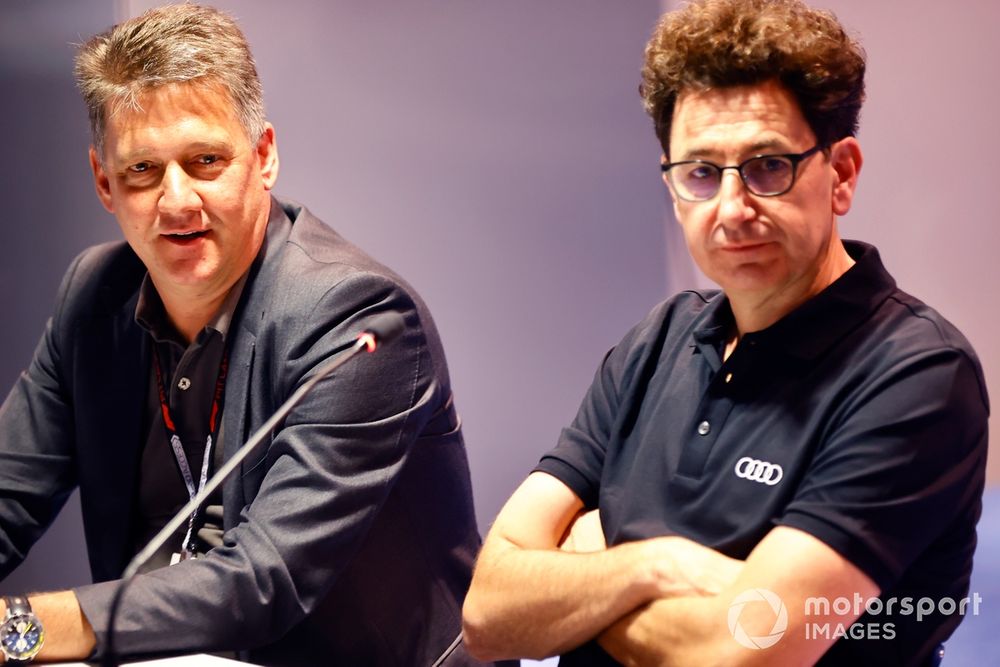
Mercedes Formula 1 chief Toto Wolff believes the series would look 'silly and erratic' if it were to introduce V10 engines before 2031 and reduce the planned five-year period for the 2026 hybrids.
The return of V10 power units has been placed on the agenda by FIA president Mohamed Ben Sulayem, with various options under discussion at this stage.
The most straightforward idea is to stick to the current plans to run the all-new hybrid engines for a five-year period between 2026 and 2030, and switch to a radically different formula from 2031 onwards.
But some parties are also pushing to introduce V10s as early as 2028, with the secondary question becoming what to do with the 2026 power units that convinced the likes of Audi and Honda to sign up.
The FIA’s single-seater director Nikolas Tombazis, for example, said at last weekend’s Chinese Grand Prix: “I think the right way to go about it is: do we want three or four years later to go to a different type of power unit? If the answer to that is yes, then there's question number two – what we do in the intervening period.
“The progress with sustainable fuels has led to views that maybe the engines could be simpler. The world economy does lead to views that maybe we should try to cut costs a bit more, and the current power units are way too expensive. That’s why the president made the comments about a V10 engine in 2028 and so on.”

But speaking in an exclusive interview with Autosport, Wolff says it would not reflect well to backtrack from the 2026 regulations that were meant to be used for five years, as F1 needs to be a "reliable partner" that manufacturers can build around.
Asked if he could accept the new regulations only being used for two or three years, Wolff replied: "If there are the right arguments on bringing it forward.
"We are looking a little bit silly as Formula 1 when we are attracting the likes of Audi and we are pitching a great hybrid engine with sustainable fuels, and then suddenly we are saying we actually only want to keep it three years and not five.
"We need to be a stable and reliable partner that says: 'These are the regulations, that is the investment budget, you need to calculate for it'. And then people can join or not.
"But - before regulations have even started - to say let's look at the next engine and power unit, I just think it makes Formula 1 look a little bit erratic.
“And that is why we all have the same interest between the FIA, Formula 1 and the teams; we want the sport to be great, rather than looking at the success of a single race or season. There needs to be a long-term plan and everybody is pulling on the same side."

Without directly mentioning Red Bull, which faces the huge task of developing its own in-house engines for 2026, Wolff suggested Mercedes' fierce rival is stirring up the idea of curtailing the upcoming rules and fast-tracking V10 engines as it is worried about its own performance with the new hybrids - a suggestion Red Bull has publicly denied.
"I think it's people that have the feeling that they are maybe not as competitive as they would wish for next year," he said.
"Remember 2014, the same people talked down the engine regulations back in the day because their power unit supplier wasn't competitive at the beginning.
“Now they are doing their own engines and I think there is a lot of fear there that it isn't going that well and that's why suddenly the manipulation business starts and the V10 comes up as an idea."
But Wolff did reaffirm that Mercedes is open minded about where F1 should go next with its future power units, as long as there is a proper process in place to ensure all interested manufacturers are aligned.
"As Mercedes we are always open to having these discussions," he explained. "What is the engine of the future? Is it a V8, is it a V10, what kind of hybrid system does it have on the car? Sustainable fuel clearly is going forward, is it a naturally aspirated or turbo engine?
"Any challenge that comes up is fine for us, as long as there is proper governance on how this engine is being decided upon. That governance is in place today, so let's stick our heads together with all the engine manufacturers and see what it is we want to have beyond 2030, and then come up with a plan that is good for Formula 1."







